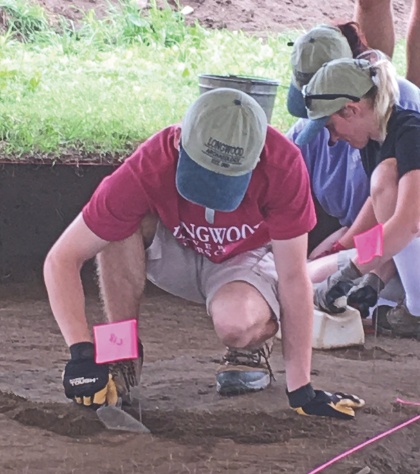Longwood faculty members were recently awarded two grants from the National Science Foundation—totaling more than $1.2 million—to fund innovative programs that will help area fourth-grade teachers incorporate science, technology, engineering and math (STEM) learning into their lesson plans and encourage college students to gain STEM competencies through archaeology field research.
One NSF grant of almost $600,000 will fund a three-year project that aims to improve STEM competency through archaeology field research. The grant was awarded to Dr. Brian Bates ’92, professor of anthropology and executive director of the Institute of Archaeology.
A second NSF grant of more than $647,000 is funding an interdisciplinary project that will develop and test a professional-development program for fourth-grade teachers in rural elementary schools. The project is a collaboration between Longwood’s Institute for Teaching through Technology and Innovative Practices (ITTIP), the mathematics and computer science department, the biological and environmental sciences department and rural schools in central and southside Virginia.
'We are hoping we can impact STEM learning for low-income, firstgeneration students who may come from educationally disadvantaged school divisions.'
DR. BRIAN BATES ’92, PROFESSOR OF ANTHROPOLOGY AND EXECUTIVE DIRECTOR OF THE INSTITUTE OF ARCHAEOLOGY
The grant was awarded to Dr. Paula Leach, director of ITTIP, which is located in South Boston; Dr. Ben Campbell, assistant professor of science education, and Dr. Virginia Lewis ’92, associate professor of mathematics education, both on the main Longwood campus; and Stephanie Playton, STEM learning specialist at ITTIP.
Bates’ project that is supported by the NSF grant (#1914456) is getting underway this fall. The NSF has long recognized archaeology as a STEM discipline, although many students do not think about the subject that way. Bates’ hypothesis is that students who participate in archaeology field research projects will achieve mastery of STEM competencies at a better rate than students who don’t.
“We are hoping we can impact STEM learning for low-income, first-generation students who may come from educationally disadvantaged school divisions,” Bates said. The grant includes $40,500 to cover scholarships for students to participate in the Summer Archaeology Field School. The grant provides an additional $119,000 in stipends directly to undergraduate students to facilitate their participation in extended field research.

One grant will provide scholarships for students to participate in Longwood’s Summer Archaeology Field School (Photo by Courtesy of Brian Bates).
The NSF grant (#1933717) awarded to the partnership of Longwood math and science professors and ITTIP faculty goes directly to the heart of the NSF mission to ensure there are plenty of capable teachers to educate the next generation in STEM and emerging STEM fields. Their $647,000 project, funded through the NSF’s STEM +Computing program, aims to help fourth-grade teachers gain experience designing lessons that integrate computational thinking into science and mathematics.
The four Longwood faculty members working in partnership are still finalizing the details of the project, which will get underway in the spring. Their plan is to work with 24 teachers over two academic years, initially focusing the lesson plans on water and watersheds.


Leave a Comment